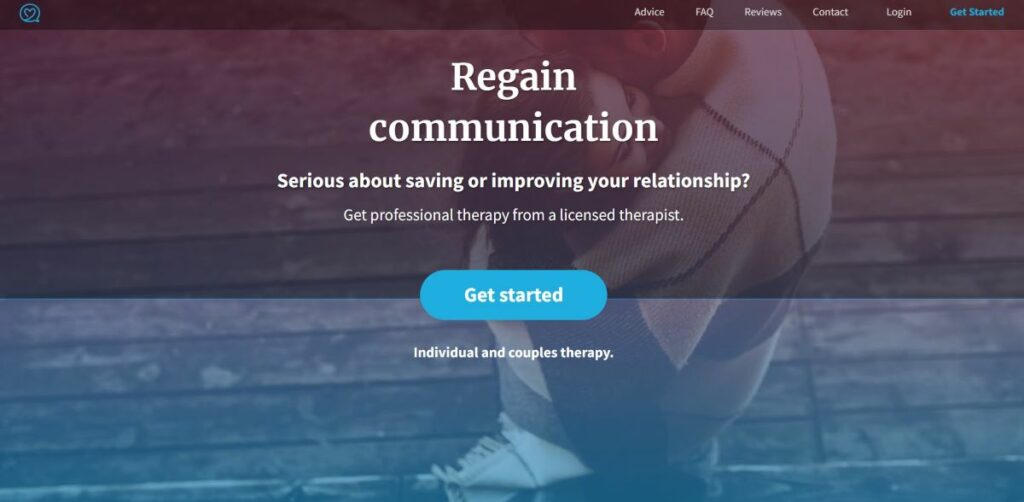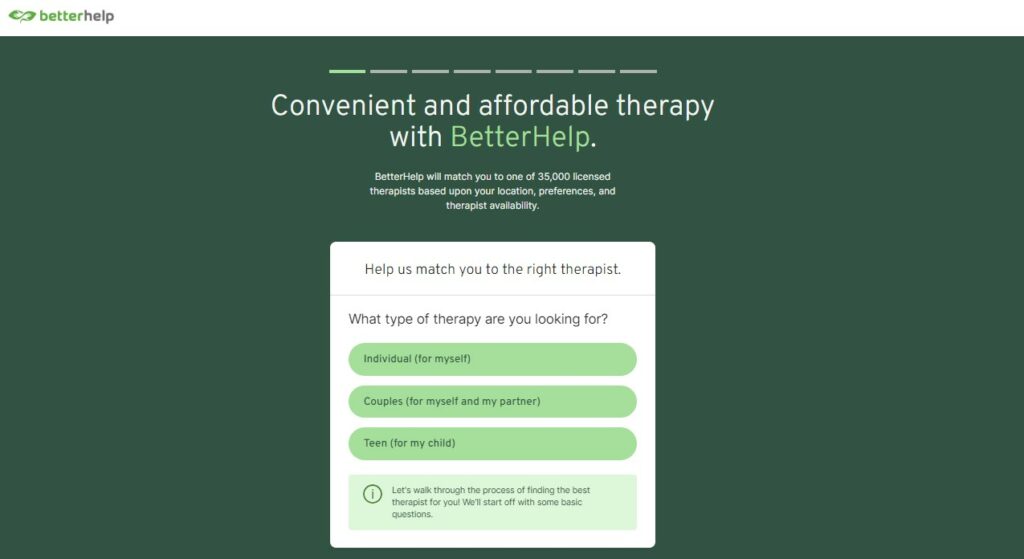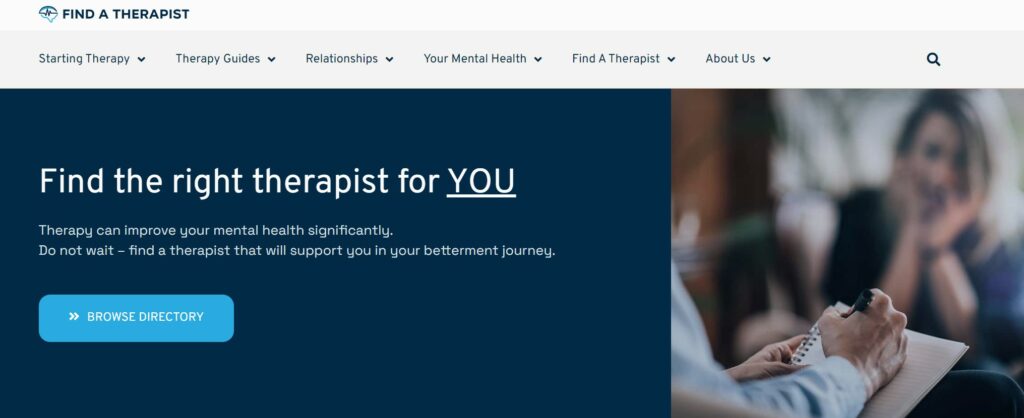Being a victim of domestic violence can put you under severe mental stress and often results in significant psychological trauma.
Moreover, you may also struggle with everyday activities, such as studying, work, and relationships due to the psychological trauma associated with domestic abuse.
Domestic violence counseling can help you cope with the effects of this type of abuse on your mental health, and provide the support you need to redeem your confidence and self-respect.
Want to skip right to the suggestions for domestic violence therapists? Here are our 4 recommended therapy solutions:
Domestic Violence Counseling Near Me
Below are the platforms that can help connect you with qualified, accredited domestic violence counselors.
| Povider | Good For | Location | Pricing |
|---|---|---|---|
| ReGain | Quick match with the right couples therapist for you | Online therapy | $65 to $90 per week (billed every 4 weeks) |
| BetterHelp | Quick match with the right therapist for you | Online therapy | $65 to $90 per week (billed every 4 weeks) |
| Find-a-therapist.com | Finding and contacting the right therapist for you | Online and in-person therapy | Varies depending on the counselor fee |
| ISTSS Directory | Finding and contacting the right therapist for you | Online therapy and in-person therapy | Varies depending on the counselor fee |
1. ReGain

Tailored for individuals and couples navigating relationship or marital issues – ReGain is your online relationship therapy solution. Starting at $65/week, you can schedule one weekly live session and message your therapist anytime. Start your path to healthier connections with ReGain – fill out their online assessment form.
- Good for: Quick match with the right couples therapist for you.
- Location: Online therapy.
- Pricing: $65 to $90 per week (billed every 4 weeks).
- Features: iOS and Android app available, message your therapist anytime, live sessions are scheduled weekly and done via live chat, phone, or video call.
ReGain is an online platform that specializes in relationship counseling. They have thousands of licensed counselors who have a wealth of experience in helping victims of domestic violence overcome the trauma that they have faced.
While ReGain can help you to overcome the trauma of domestic abuse, if you are still with your abusive partner, it’s best to get in-person help. Prior to seeking counseling, you need to ensure your physical safety. You can call the Domestic Violence Hotline on 1800-799-7233 for advice if your internet usage is monitored.
2. BetterHelp

Explore emotional well-being with BetterHelp – your partner in affordable online therapy. With 30,000+ licensed therapists and plans starting from only $65 per week, BetterHelp makes self-care accessible to all. Complete the questionnaire to match with the right therapist.
- Good for: Quick match with the right therapist for you.
- Location: Online therapy.
- Pricing: $65 to $90 per week (billed every 4 weeks).
- Features: iOS and Android app available, message your therapist anytime, live sessions are scheduled weekly and done via live chat, phone, or video call.
BetterHelp is an online platform that has an extensive network of licensed therapists with experience and training in domestic violence counseling. On this platform, you will be matched with the right therapist after a short questionnaire where you can express your needs and preferences.
Read our BetterHelp review here.
3. Find-a-therapist.com

- Good for: Finding and contacting the right therapist for you.
- Location: Online and in-person therapy.
- Pricing: Varies depending on the counselor fee.
- Features: Filter your search, find accessible and effective online and in-person therapy, find guides on different types of therapy.
Find-a-therapist.com provides an online therapist directory where you can personalize your search to find therapists or providers who specialize in domestic violence counseling, such as Emergent Mental Health Services or New Foundation Counseling.
4. ISTSS Therapist Directory

- Good for: Finding and contacting the right therapist for you.
- Location: Online therapy and in-person therapy.
- Pricing: Varies depending on the counselor fee.
- Features: Online directory, use the filters available to narrow down your search results, contact the therapist you choose directly.
The International Society for Traumatic Stress Studies (ISTSS) provides an online directory that can help you find a counselor near you who has experience helping domestic violence survivors. Once the directory displays a list of therapists, you can directly contact several counselors to get more information about their services.
What is Domestic Violence?

Domestic violence or domestic abuse refers to physical, emotional, sexual, or mental abuse perpetrated by someone closely related to the victim. In most cases, an intimate partner is an abuser.
According to the National Coalition Against Domestic Violence (NCADV), almost 20 individuals per minute are physically abused by their intimate partners in the US, and women experience more domestic violence than men, on average.
The Cycle of Domestic Abuse
In most cases, domestic violence follows the typical cycle of abuse, consisting of four phases:
| Phase | Description |
|---|---|
| 1. Tension-building phase | In this phase, disagreements and a breakdown of communications may occur. The victim usually becomes afraid and tries to alleviate the situation; however, the abuser may still begin to get angry. |
| 2. Incident | The incident is typically marked by the verbal, mental, or physical abuse carried out by the abuser. It commonly starts with anger or threats and ends with abuse. |
| 3. Reconciliation phase | During this phase, an abuser may display apologetic behavior, blame the victim, or deny the abuse. |
| 4. Honeymoon phase | The honeymoon or calm phase refers to the period when no domestic abuse occurs, and both victim and abuser try to forget about the incident. Unfortunately, this phase is again followed by the tension-building phase in most cases, starting the cycle from the beginning. |
Prevalence of domestic abuse in the US
According to the National Coalition Against Domestic Violence (NCADV), about 10 million men and women experience domestic violence annually in the United States. Unfortunately, this type of abuse is not limited to adults, as one in every 15 children are also exposed to domestic violence.
Impacts of Domestic Abuse

Domestic violence can result in many physical and mental health issues, such as anxiety and stress, amongst others. Some of these are discussed below.
Physical Manifestations of Domestic Violence
When your partner or another person closely related to you abuses you physically, this can result in:
- Bruises or open wounds, broken bones, concussions, and other serious injuries.
- Breathlessness or breathing difficulties due to physical abuse affecting the respiratory system (such as neck holding, chest trauma, etc.).
- Rapid shaking, chills, and an increased heartbeat.
- Sleeplessness, sexual dysfunction, or menstrual cycle abnormalities due to fear of being abused again.
Mental and Emotional Effects of Domestic Abuse
The impacts of domestic violence are not only physical but also psychological. Impacts on your mental well-being may include but are not limited to:
- Post-traumatic stress disorder (PTSD), which is characterized by repetitive flashbacks and nightmares about the abuse, severe anxiety, mood swings, and distorted thoughts.
- Decreased self-esteem and self-confidence.
- Feelings of guilt and shame.
- Depression, severe stress, and a persistent low mood.
- Loss of appetite and a disturbed eating schedule.
- Loss of interest in daily activities, and a loss of concentration.
Furthermore, you are at increased risk of substance abuse disorders if you face domestic abuse at a young age. In severe cases, domestic abuse may also lead to suicidal thoughts or ideation, leading to suicide attempts.
Effects of Domestic Violence on Children

Children who witness or experience child abuse during their childhood face long-term side effects, which may manifest in some of the following symptoms:
- Lifelong depression, stress, and anxiety.
- Childhood mental trauma, leading to PTSD.
- Decreased self-esteem and lower performance in academic activities.
- Social isolation and relationship difficulties.
- Physical manifestations, which may include nightmares, bed wetting, difficulty sleeping, increased frequency of tantrums, and many others.
The Domestic Violence Hotline
The National Domestic Violence Hotline provides 24-hour, 7-day-a-week emergency support for people experiencing domestic violence in the United States. It can be accessed by dialing the nationwide number 1-800-799-7233 or by texting START to 88788.
You can get help from this service if you are in immediate danger of experiencing acts of domestic violence, such as physical abuse, sexual assault, economic control, restricted movement, reduced access to basic facilities, and any other acts of physical, mental, sexual, or emotional abuse.
The hotline can help you through crisis intervention, safety planning, and directly calling local shelter services so that you can escape your abusive partner. Moreover, it also provides referrals to agencies specialized in managing sexual assault, legal issues, and your economic stability. These services may also be able to connect you with a counselor, once you and your children are safe.
Types of Therapy Commonly Used
Domestic violence counselors can use different types of psychotherapy to help you get through the psychological effects of domestic violence, and regain your self-esteem. Some of the psychotherapies are explained below.
Non-exposure and Focused Cognitive-Behavioral Therapy (CBT)

Focused and non-exposure CBT both provide integrated management techniques for the mental trauma associated with domestic violence. Behavior modification through CBT can help you change negative thoughts about yourself as a result of the abuse you experienced.
In non-exposure CBT, the mental conditions and symptoms associated with domestic abuse are alleviated through psychoeducation, mindfulness, and behavior modification. However, systematic exposure to these traumatic memories is avoided in non-exposure CBT, as repetitive exposure to those memories can worsen the symptoms in some situations.
In present-focused CBT, a counselor usually focuses on the current symptoms of trauma rather than exploring the causes retrospectively. For instance, you may become reluctant to form another relationship due to domestic violence that was perpetrated by your previous partner. The therapist would use present-focused CBT to help you move forward and alleviate the negative emotions associated with the previous abusive relationship.
Interpersonal Psychotherapy
This type of psychotherapy is mainly used to manage the interpersonal difficulties faced by domestic abuse victims.
In interpersonal psychotherapy, a counselor focuses on your emotional withdrawal due to previous mental traumas, managing your feelings of loneliness, and closely analyzing your disagreements with your partner (potentially showing you that the issues in the relationship weren’t your fault, if this is something you’re struggling to accept).
Moreover, a counselor may help you establish greater levels of social support to ensure your mental well-being when conducting interpersonal psychotherapy.
Cognitive Processing Therapy (CPT)

CPT is an effective type of psychotherapy for alleviating the symptoms of depression and PTSD, often caused by domestic violence. In CPT, a counselor processes your negative thoughts by providing you with a greater level of awareness about the situation.
After processing negative thoughts, the counselor can help you learn the positive ways of exploring and understanding your life, rather than your frame of mind being controlled by the trauma you have experienced.
Eye Movement Desensitization Reprocessing (EMDR) therapy
EMDR is a type of psychotherapy used to manage the symptoms of mental trauma and PTSD associated with domestic violence. During EMDR, a counselor may ask you to remember the traumatic events while performing bilateral (rhythmic, such as left to right) stimulations in different forms, such as horizontal eye movements or tapping your knees.
In this way, a counselor helps you process the traumatic memories that were previously a source of negative thoughts and attitudes. After processing these negative thoughts, your mind can begin to overcome the overwhelming negative emotions you typically experience, making you emotionally stronger and with a much healthier frame of mind.
Conclusion
Domestic violence refers to abuse done by people close to us, which may lead to serious mental health deterioration. A domestic violence counselor can help you cope with the psychological effects of domestic abuse.
If you are in a dangerous domestic abuse situation right now, you can use the National Domestic Violence Hotline (1-800-799-7233) to get immediate help. If you are facing an immediate threat to your physical safety, call 911 immediately.
References
Roddy, J., & Dubrow-Marshall, R. (2023). Understanding Domestic Abuse. In Working with Client Experiences of Domestic Abuse (pp. 22-42). Routledge. Link.
Smith, R. (2023). Literature review applying therapeutic theory and practice in the field of domestic abuse and coercive control. European Journal for Qualitative Research in Psychotherapy, 13. Link.






